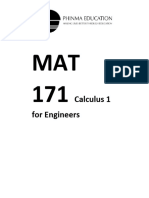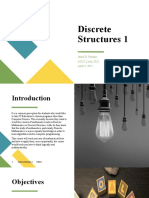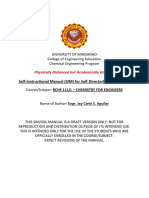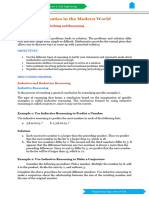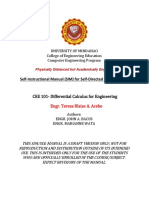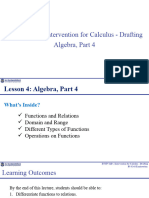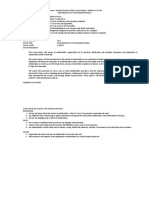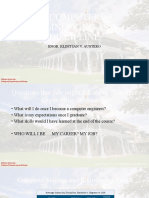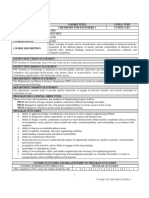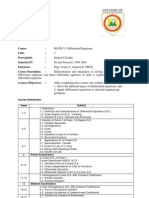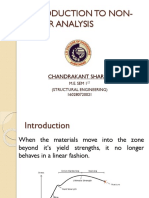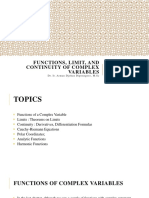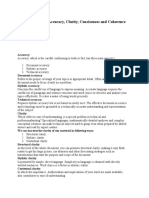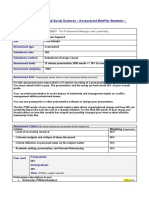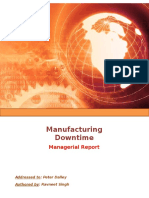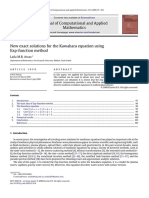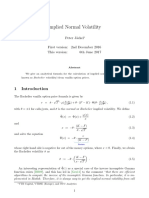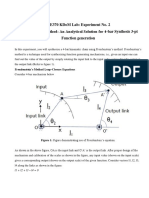College of Engineering Education
CEE 101 – COURSE SYLLABUS
1. Course Number: CEE 101
2. Course Name: Engineering Calculus 1
3. Course Description: A course in differential calculus covering topics such as functions, limits,
continuity, derivatives of both algebraic and transcendental functions and
their applications, higher-order derivatives, implicit differentiation, curve
tracing, indeterminate forms, and partial derivatives.
4. Pre-requisite: CEE 100
5. Co-requisite: None
6. Credit: 3.0 units Lecture
7. Class/Lab Schedule: 6 hours/week
8. Program Educational Objectives (PEO) of BS Computer Engineering (BSCpE) Program:
Three to five years after graduation, the BSCpE graduates are expected to:
1. Pursue to be globally competitive through engineering professionals engagement, completion of an
advanced degree, and/or participating in professional development programs or trainings.
2. Demonstrate professional success through collaborations and innovations in the field; addressing
technical, environmental, economic, social, political, and/or business challenges.
3. Exhibit professional behavior and attitude in engineering practice.
9. Student Outcomes (SO) and their links to PEO
The Bachelor of Science in Computer Engineering (BSCpE) program shall produce PEO
graduates who will be able to: 1 2 3
apply knowledge of mathematics and science to solve complex computer
● SO a * ✓ ✓
engineering problems
● SO b design and conduct experiments, as well as to analyze and interpret data ✓ ✓
design a system, component, or process to meet desired needs within
● SO c ✓ ✓ ✓
realistic constraints, in accordance with standards
● SO d function in multidisciplinary and multi-cultural teams. ✓ ✓ ✓
● SO e identify, formulate, and solve complex computer engineering problems. ✓ ✓
● SO f understand professional and ethical responsibility. ✓ ✓ ✓
communicate effectively complex computer engineering activities with the
● SO g ✓ ✓
engineering community and with society at large.
understand the impact of computer engineering solutions in a global,
● SO h ✓ ✓
economic, environmental, and societal context.
● SO i recognize the need for, and engagement in life-long learning. ✓ ✓
● SO j know contemporary issues. ✓ ✓
use techniques, skills, and modern engineering tools necessary for computer
● SO k ✓ ✓
engineering practice.
CEE 101 – Engineering Calculus 1 Date Prepared: Revision No.: Date Effective: Page 1 of 9
March 12, 2020 01 June 1, 2020
� College of Engineering Education
CEE 101 – COURSE SYLLABUS
know and understand engineering and management principles as a member
● SO l and leader of a team, and to manage projects in a multidisciplinary ✓ ✓ ✓
environment
SO
● understand at least one specialized field of computer engineering practice. ✓ ✓ ✓
m
Note: * SO being addressed in this course
CEE 101 – Engineering Calculus 1 Date Prepared: Revision No.: Date Effective: Page 2 of 9
March 12, 2020 01 June 1, 2020
� College of Engineering Education
CEE 101 – COURSE SYLLABUS
10. Course Outcomes (CO) of and their links to SO
SO
Upon completion of the course, the students are expected a b c d e f g h i j k l
to:
CO 1. Differentiate algebraic and transcendental functions I
CO 2. Apply the concept of differentiation in solving word
I
problems
CO 3. Analyze and trace transcendental curves I
Legend:I = Upon attainment of this CO, students will have been introduced to the SO.
E = Upon attainment of this CO, students will have enabled themselves to attain
the SO.
D = Upon attainment of this CO, students will have demonstrated partly or fully
the SO.
CO and Assessment Task Alignment
Assessment Task Assessment
CO Theory-based Practice-based Schedule Coverage
CO 1. Differentiate algebraic Multiple Choice Final Exam ● Limits and Graphs
and transcendental functions Questions ● Derivative of functions
(Problem ● Higher Order derivatives
Solving)
● Implicit and explicit
differentiation
● Partial Derivatives
CO 2. Apply the concept of Multiple Choice Final Exam ● Polynomial curves
differentiation in solving Questions ● Maxima and Minima
word problems. (Problem ● Time Rates
Solving)
● The differential
● Solutions of equations:
Newton’s Method
CEE 101 – Engineering Calculus 1 Date Prepared: Revision No.: Date Effective: Page 3 of 9
March 12, 2020 01 June 1, 2020
� College of Engineering Education
CEE 101 – COURSE SYLLABUS
CO 3. Analyze and trace Multiple Choice Final Exam ● Polynomial Curve Tracing
polynomial and Questions ● Trigonometric Function
transcendental curves (Problem ● Exponential Functions
Solving)
● Logarithmic Functions
● Hyperbolic Functions
Assessment Task Details (Theory-based)
Assessment Coverage Assessment Details
Schedule Task
Final Exam Limits and Graphs, Multiple-Ch In this multiple-choice type of assessment task, you are
Differentiation of oice Type of expected to solve limits of a function and obtain a deep
Algebraic, Problem knowledge of solving derivatives of different kinds of
Trigonometric, Solving functions – may it be in explicit or implicit, ordinary or
Exponential and partial. At the same time solve nth order derivatives.
Logarithmic Functions,
Higher Oder Derivatives,
Implicit and Explicit
Differentiation, and Multiple-Ch You are expected to apply differentiation techniques to
Partial Derivatives oice Type of solve and analyze curve tracing problems – increasing
Problem and decreasing functions, critical points, and concavity.
Tangents and Normal to Solving You are also going to solve equations of tangents and
plane curves, Increasing normal to a given plane curve. Apply deep knowledge
and Decreasing and analysis to optimization problems (maxima and
Functions, Critical minima applications), related time rates, and
Points: Maxima and approximations.
Minima, Concavity,
Applications of Maxima
Minima, Time Rates,
The Differential,
Solutions of equations:
Newton’s Method
Trigonometric Function You are expected to solve problems related to
Exponential Functions transcendental curves by applying differentiation
Logarithmic Functions methods.
Hyperbolic Functions
11. COURSE OUTLINE AND TIME FRAME
TIME
TOPICS FOR FIRST EXAMINATION TLA Required Readings
FRAME
CEE 101 – Engineering Calculus 1 Date Prepared: Revision No.: Date Effective: Page 4 of 9
March 12, 2020 01 June 1, 2020
� College of Engineering Education
CEE 101 – COURSE SYLLABUS
Week 1 to ⮚ Orientation
⮚ Orientation (UM VMG, CEE PEO,
Week 3
Grading System)
Chapter 1: Tan, Soo T
⮚ Functions, Limits, and Graphs ⮚ Brainstorming (2010)Calculus (International
⮚ Lecture
⮚ Continuity Edition).USA; Brooks/Cole
⮚ Problem Solving
Chapter 3.2 – 3.6: Warner, Stefan
⮚ The Derivative, Slope and Rate (2011) Applied Calculus (5th
of Change Edition) Boston, MA: Brooks/Cole
⇒ Long Method Derivation Cengage Learning
TOPICS FOR SECOND EXAMINATION
Week 4 to
⮚ Derivatives of Algebraic
Week 5 ⮚ Lecture Chapter 2.2 – 2.3: Tan, Soo T
Functions ⮚ Problem Solving (2010)Calculus (International
⇒ Rules of Differentiation ⮚ Board Works
Edition).USA; Brooks/Cole
(Product Rule, Quotient
Rule, Chain Rule, and
General Power Rule)
⮚ Higher Order Derivatives
⮚ Implicit and Explicit Functions
TOPICS FOR THIRD EXAMINATION
Week 6
⮚ Polynomial Curves
Chapter 3: Tan, Soo T
To ⇒ Tangents and Normal to ⮚ Lecture (2010)Calculus (International
Plane Curves ⮚ Problem Solving Edition).USA; Brooks/Cole
Week 7 ⮚ Board Works
⇒ Increasing and Decreasing
Chapter 5.1: Warner, Stefan
Functions
(2011) Applied Calculus (5th
⇒ Critical Points Edition) Boston, MA: Brooks/Cole
⇒ 1st Derivative Test Cengage Learning
⇒ Concavity: Points of
Inflection
⇒ 2nd Derivative Test
TOPICS FOR FOURTH EXAMINATION
Week 8 ⮚ Lecture Chapter 20: Ayres, Frank (2011)
⮚ Applications of Derivatives
⮚ Problem Solving Schaum’s Easy Outlines of
to ⇒ Optimization Problems: ⮚ Board Works Calculus: New York: McGraw-Hill
Applications of Maxima and
Week 9
Minima
⇒ Time Rates
CEE 101 – Engineering Calculus 1 Date Prepared: Revision No.: Date Effective: Page 5 of 9
March 12, 2020 01 June 1, 2020
� College of Engineering Education
CEE 101 – COURSE SYLLABUS
⮚ The Differential
⇒ Differential of Arc Length
TOPICS FOR FIFTH EXAMINATION
Week 10 ⮚ Lecture Chapter 17: Ayres, Frank (2011)
⮚ Trigonometric Functions
⮚ Problem Solving Schaum’s Easy Outlines of
to ⇒ Elementary Properties ⮚ Board Works Calculus: New York: McGraw-Hill
⇒ Derivatives of Trigonometric
Week 12 Functions
⇒ Maxima and Minima
⮚ Inverse Trigonometric Functions Chapter 18: Ayres, Frank (2011)
⇒ Elementary Properties Schaum’s Easy Outlines of
⇒ Derivatives of Trigonometric Calculus: New York: McGraw-Hill
Functions
⇒ Maxima and Minima
TOPICS FOR SIXTH EXAMINATION
Week 13 ⮚ Lecture Chapter 25: Ayres, Frank (2011)
⮚ Exponential and Logarithmic
⮚ Problem Solving Schaum’s Easy Outlines of
to Functions ⮚ Board Works Calculus: New York: McGraw-Hill
⇒ Elementary Properties
Chapter 26: Ayres, Frank (2011)
Week 14 ⇒ Derivatives of Exponential
Functions Schaum’s Easy Outlines of
⇒ Derivatives of Logarithmic Calculus: New York: McGraw-Hill
Functions
⮚ Hyperbolic Functions
⇒ The Hyperbolic Functions and
their Basic Formulas
⇒ Derivatives of Hyperbolic
Functions
TOPICS FOR SEVENTH EXAMINATION
Week 15 ⮚ Lecture
⮚ Parametric Equations
⮚ Problem Solving
to ⇒ Curve Tracing ⮚ Board Works
⮚ Partial Derivatives Chapter 27: Ayres, Frank (2011)
⮚ Limits involving indeterminate Schaum’s Easy Outlines of
Week 16
forms Calculus: New York: McGraw-Hill
⮚ L’ Hospitals Rule
TOPICS FOR FINAL EXAMINATION
Week 17 ⮚ Lecture Chapter 21: Ayres, Frank (2011)
⮚ Solutions of Equations:
⮚ Problem Solving Schaum’s Easy Outlines of
to Newton’s Method ⮚ Board Works Calculus: New York: McGraw-Hill
⇒ Newton’s Method
Week 18 ⇒ Difficulties Present in
Newton’s Method
⇒ The First Approximation
⇒ Solutions of Equations
CEE 101 – Engineering Calculus 1 Date Prepared: Revision No.: Date Effective: Page 6 of 9
March 12, 2020 01 June 1, 2020
� College of Engineering Education
CEE 101 – COURSE SYLLABUS
⮚ Review of All Topic from Exam 1
–7
12. TEXTBOOK: Larson, Ron (2019). Calculus (11th Ed). Australia: Cengage Learning.
References:
a. Stewart, James (2019). Calculus: concepts and contexts (4th Edition). Australia: Cengage
b. Larson, Ron (2017). Calculus: an applied approach with CalcChat & CalcView (10th
Edition). Australia : Cengage Learning.
c. Berresfor, Geoffrey C. et. al. (2016). Applied calculus (7th Edition). Brooks/Cole, Cengage
Learning
d. Morris, Carla C. (2016). Fundamentals of Calculus. Hoboken, New Jersey: Wiley
e. Arul, Ramalinga, et. al. (2016). Advanced calculus for applications. New York, NY:
Magnum Publishing.
13. COURSE EVALUATION
Assessment methods Weights
EXAMINATIONS 70%
A Exam 1 – Exam 7 35%
.
B. Final Exam 35%
CLASS PARTICIPATIONS 30%
C. Quizzes/Assignments/Plates 10%
D Plates Compilation/Assignments 20%
.
Total 100%
CEE 101 – Engineering Calculus 1 Date Prepared: Revision No.: Date Effective: Page 7 of 9
March 12, 2020 01 June 1, 2020
� College of Engineering Education
CEE 101 – COURSE SYLLABUS
14. POLICIES AND GUIDELINES
a. Attendance is counted from the first regular class meeting.
b. A validated student identification card must always by worn be all students while
attending classes.
c. Cheating is strictly prohibited. Any form of dishonesty shall be dealt with accordingly.
Honesty is called for at all times.
d. Students who incur absences equivalent to more than 20% of the course hours
required shall be dropped from the course.
e. Valid examination permits are necessary in taking the examinations as scheduled.
f. No special quiz shall be given to any student who comes in late or absent during
classes.
g. Base-20 grading policy should be observed.
h. Students who obtained failing scores in major exams are recommended to attend
the tutorial class.
i. Observe other University's policies and guidelines.
Prepared by: Reviewed by:
ESTHER CONSUELO TAN, EE DR. CHOSEL P. LAWAGON
MICHELLE DAAROL, CE ChE Program Head
DELAN BACUS, ME
CRIJAMAICA OCEŇA, CHE
ELENA MATILLANO, ECE
KIMBERLY NEPA, CPE
References Reviewed by: Recommending Approval:
BRIGIDA E. BACANI CHARLITO L. CAÑESARES, DEng-ME
Head - LIC Dean, College of Engineering Education
Approved by:
CEE 101 – Engineering Calculus 1 Date Prepared: Revision No.: Date Effective: Page 8 of 9
March 12, 2020 01 June 1, 2020
� College of Engineering Education
CEE 101 – COURSE SYLLABUS
PEDRITO M. CASTILLO II, Ed.D
SVP, Institute of Pedagogical Advancement
and Competitiveness
CEE 101 – Engineering Calculus 1 Date Prepared: Revision No.: Date Effective: Page 9 of 9
March 12, 2020 01 June 1, 2020




